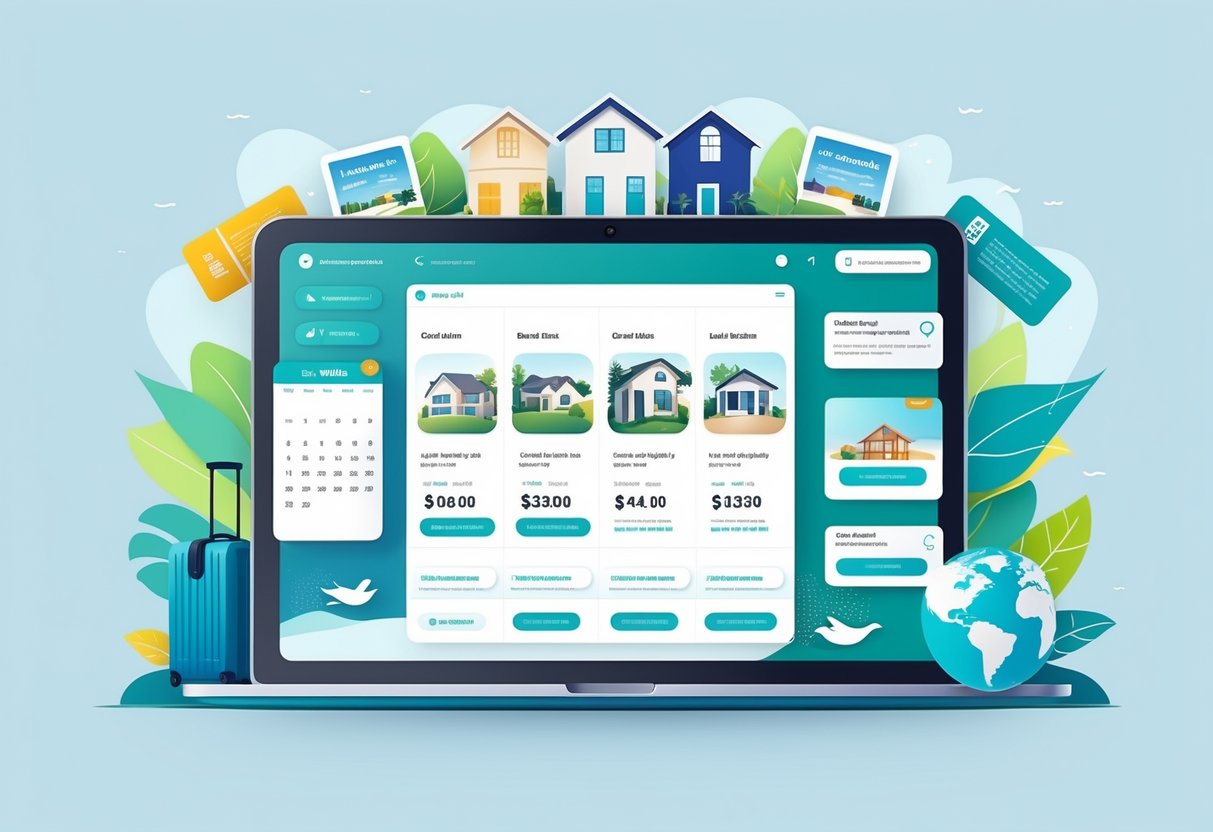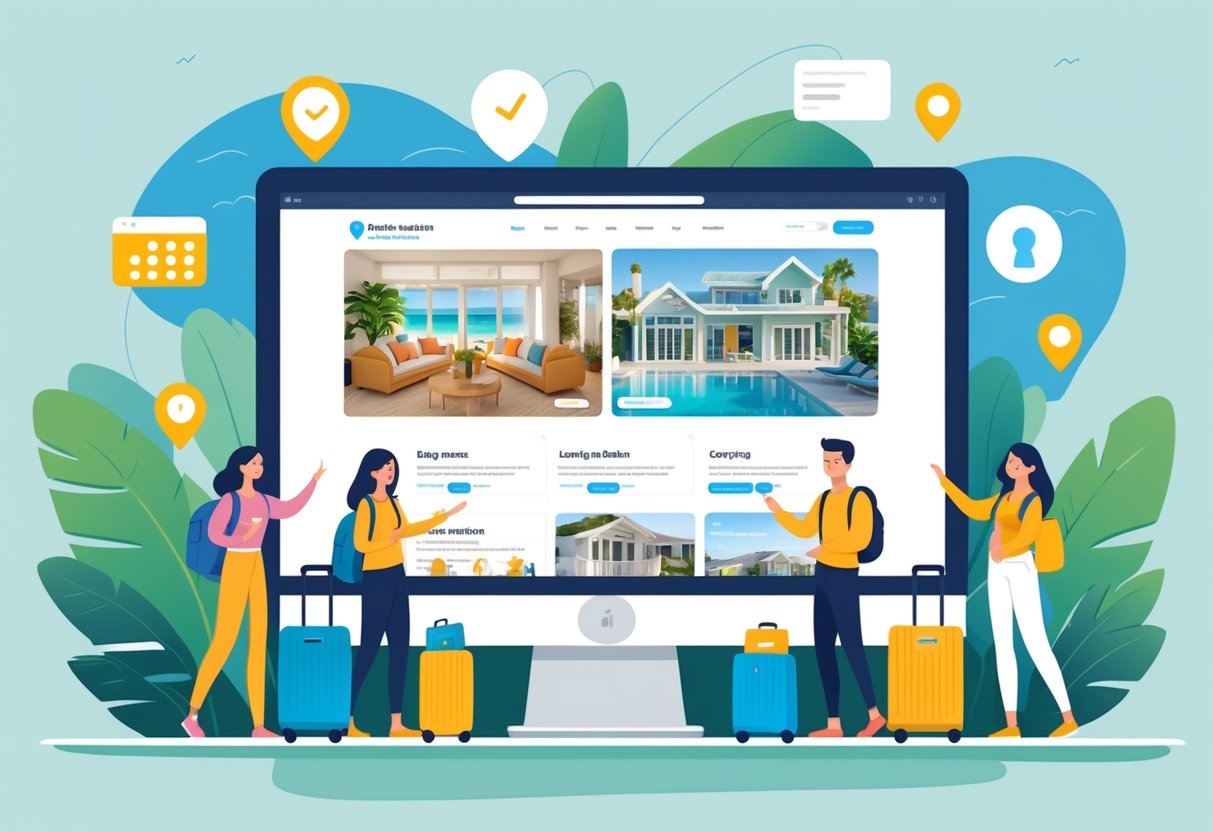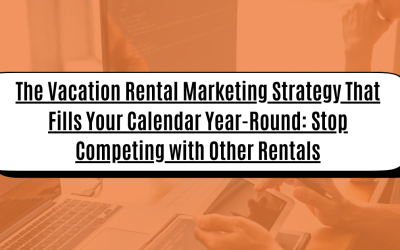Vacation rental owners often lose 10% to 20% of their booking revenue to third-party platforms like Airbnb and Vrbo, thanks to commission fees.
A vacation rental direct booking platform cuts out these middlemen, letting guests book straight through the owner’s website.
Direct booking platforms let property owners keep all their booking revenue and stay in full control of pricing, policies, and guest relationships.

These platforms flip the script on traditional booking sites. Instead of fighting for attention in crowded marketplaces, owners get to build their own branded websites and set their own rules.
Direct booking websites usually bundle booking engines, payment processing, and property management tools into one place.
The shift toward direct bookings isn’t just about saving on fees. Property owners grab valuable guest data, build real customer relationships, and get more repeat business than they would through platforms.
Some savvy owners use direct booking platforms alongside traditional listing sites. That way, they reach more guests and hang onto more profit.
Key Takeaways
- Direct booking platforms cut out 10-20% commission fees from sites like Airbnb and Vrbo.
- Owners get full control over pricing, policies, guest communication, and branding.
- Must-have features: secure payment processing, mobile-friendly design, and integration with existing booking channels.
What Is a Vacation Rental Direct Booking Platform?

A vacation rental direct booking platform is a website system that lets property owners take reservations without third-party booking sites.
This technology helps hosts keep more money from bookings and build stronger guest relationships.
Definition and Core Features
A vacation rental direct booking website is a personalized online platform where owners showcase properties and connect directly with guests.
It takes online travel agencies out of the equation during the booking process.
The platform usually includes:
Property Management Tools
- Calendar sync across multiple listings
- Rate management and pricing controls
- Guest communication systems
- Payment processing
Booking System Components
- Real-time availability checking
- Secure payment gateways
- Automated confirmation emails
- Guest info collection forms
Website Features
- Photo galleries and property descriptions
- Guest review sections
- Mobile-responsive design
- Search engine optimization tools
Most platforms use pre-built templates and integrated booking systems so setup isn’t a headache.
Owners can focus on guests, not tech headaches.
Direct Booking vs. OTAs
Direct bookings happen when guests reserve properties without using third-party platforms like Airbnb or Booking.com.
They book through the owner’s website, by email, or on the phone.
Key Differences:
| Direct Booking Platform | OTAs (Airbnb, Vrbo, Booking.com) |
|---|---|
| No commission fees | 3-15% commission fees |
| Full guest data access | Limited guest information |
| Complete control over policies | Platform rules apply |
| Direct guest communication | Platform-mediated messages |
OTAs like Airbnb and Vrbo bring built-in marketing reach to millions of travelers, but they charge hefty fees and control the guest relationship.
Direct booking platforms put hosts in the driver’s seat for reservations, guest experiences, and revenue.
Hosts set their own cancellation policies and talk directly with guests.
The trade-off? OTAs bring exposure, while direct booking sites need more effort to drive traffic—think advertising and SEO.
Benefits for Hosts and Guests
Host Benefits:
Direct booking platforms can help owners save about 15% in platform fees compared to Airbnb or Booking.com.
That bump in profit can really add up over a year.
Hosts get full access to guest info—emails, phone numbers, the works—which makes it easier to build repeat business and run targeted marketing.
They can also craft their own policies—cancellation, pets, check-in, you name it—without platform interference.
Guest Benefits:
Guests usually find better rates on direct booking websites since hosts aren’t paying commission fees.
Many owners sweeten the deal with exclusive discounts for direct bookings.
The process is often simpler, with fewer hoops to jump through. Guests talk directly to owners, so they get quicker responses and a more personal touch.
Direct booking sites often show more detailed property info and local recommendations.
Hosts can share their favorite spots and insider tips you just won’t find on generic platforms.
There’s also more payment flexibility.
Hosts can accept different payment methods and set up custom payment schedules, especially for longer stays.
How Direct Booking Platforms Work

Direct booking platforms connect vacation rental owners with guests through a streamlined booking process.
They integrate with property management systems and handle secure payments from start to finish.
These platforms manage everything from the first inquiry to payment confirmation, all while keeping data secure.
Booking Flow and Guest Experience
The booking process kicks off when guests land on a vacation rental website and browse properties.
They pick their dates, check real-time availability, and see pricing that updates instantly.
Guests can dive into property details, photos, and amenities before deciding.
The platform breaks down all costs—nightly rates, cleaning fees, taxes—so there are no surprises.
Once they choose a property, guests enter their info and payment details.
The system grabs guest data—names, emails, phone numbers, booking preferences—for future marketing.
The platform fires off automatic confirmation emails with booking details, check-in instructions, and property info.
Guests get follow-up messages as their stay approaches.
Key booking flow steps:
- Property search and selection
- Date and pricing confirmation
- Guest info collection
- Payment processing
- Automated confirmations and communications
Integration With Property Management Systems
Most direct booking platforms connect with property management systems like Hostfully or other PMS solutions to sync booking data automatically.
This PMS integration prevents double bookings and keeps calendars updated across every platform.
When a guest books through the direct booking site, the reservation pops up instantly in the PMS.
The PMS blocks those dates on other sites like Airbnb and Vrbo.
PMS integrations also sync guest info, special requests, and payment status.
Property managers can see all bookings in one dashboard, no matter where guests booked.
The integration works both ways—bookings from other platforms update the direct booking calendar automatically.
This real-time sync is a lifesaver for avoiding overbookings.
Some platforms, like WordPress, connect with multiple property management tools through plugins and third-party add-ons.
Payment Processing and Security
Direct booking platforms use secure payment processors like Stripe for safe credit card transactions.
These systems encrypt guest payment info and meet industry security standards.
The platform can collect full payment upfront or split it into deposits and final balances.
Owners decide on their preferred payment schedule and policies.
Stripe and similar processors handle all kinds of payment methods—major credit cards, debit cards, digital wallets.
International bookings? Multi-currency processing handles that too.
Security features include SSL encryption, fraud detection, and secure data storage.
Guest payment info stays protected throughout the process.
Platforms like Boostly offer payment solutions tailored for vacation rentals.
These tools get the quirks of short-term rental payments and security needs.
Key Features to Look For in a Direct Booking Website
A solid direct booking website needs the right tools to compete with Airbnb and Booking.com.
The essentials: real-time booking management, mobile-friendly design, automated pricing updates, and full brand control.
Booking Calendar and Management Tools
A booking calendar is at the heart of every vacation rental website.
Owners need real-time updates to prevent double bookings.
The calendar should sync with other booking sites, so when someone books on Airbnb, those dates block off on your direct booking site right away.
Essential calendar features:
- Real-time availability updates
- Manage multiple properties from one dashboard
- Automated confirmations and guest messages
- Integration with cleaning and maintenance schedules
Advanced systems include guest messaging tools built in.
Owners can chat with guests before, during, and after their stay.
Property managers juggling several rentals need bulk calendar tools.
They should block dates, adjust rates, and update availability across properties in a few clicks.
Mobile Optimization and User Interface
Over 60% of vacation rental bookings happen on mobile devices.
A direct booking site has to work flawlessly on phones and tablets.
Mobile optimization must-haves:
- Loads in under 3 seconds
- Touch-friendly buttons and navigation
- Easy-to-read text—no pinching or zooming
- Simple booking process with as few steps as possible
The user interface should guide guests smoothly from browsing to booking.
If navigation is clunky or confusing, guests will bail and book somewhere else.
Search filters help guests find what they want fast.
Filters for dates, guest count, price, and amenities like pools or pet-friendly properties are key.
Payment processing needs to be secure and accept multiple payment options—credit cards, PayPal, Apple Pay, Google Pay, and so on.
Dynamic Pricing and Channel Sync
Dynamic pricing tools update rental rates automatically based on demand, local events, and what competitors charge.
This boosts revenue without endless manual tweaks.
Smart pricing looks at:
- Seasonal demand
- Local events and holidays
- Weather forecasts
- Competitor rates
- Historical booking data
Channel sync keeps your rates consistent across all platforms.
When the dynamic pricing tool updates your direct booking site, it should update Airbnb, Vrbo, and others too.
Pricing automation perks:
- More revenue during busy times
- Competitive rates in slow seasons
- Less manual work for owners
- Consistent pricing everywhere
Advanced systems let you set minimum and maximum rates.
That stops prices from going off the rails during wild demand swings.
Customization and Branding Options
Full brand control is where direct booking sites shine compared to third-party platforms.
Owners can show off their style and build loyalty to their own properties.
Key branding features:
- Custom domain names
- Logo and color scheme matching
- Personalized welcome messages
- Pro-level property photos
SEO tools help your rental website show up in Google searches.
Basic SEO plugins should handle titles, descriptions, and image tags.
Content management tools let owners add area guides, house rules, and detailed descriptions.
These help guests see what makes each place unique.
Social media integration makes it easy to share property photos and booking links.
That pushes your marketing reach beyond just the website.
Advanced customization can include custom booking forms, unique email templates, and tailored check-in instructions for each property.
Top Vacation Rental Direct Booking Platforms and Tools
Property managers can pick from specialized platforms made for vacation rentals or general website builders with booking features.
Big names like Boostly and Hostfully offer all-in-one direct booking solutions.
WordPress brings flexible customization through dedicated plugins.
Purpose-Built Platforms vs. Website Builders
Purpose-built platforms create websites just for vacation rental bookings.
They come with built-in reservation systems, payment processing, and property management features.
Website builders for vacation rentals usually offer drag-and-drop editors and templates.
They’re great for owners who don’t want to mess with code.
Purpose-built platforms offer:
- Integrated booking engines
- Automatic calendar syncing
- Guest communication tools
- Revenue management
General website builders provide:
- More design flexibility
- Lower monthly costs
- Broader customization
- Third-party integrations
Purpose-built solutions make sense for managers with multiple properties who need advanced tools.
Website builders are better for single-property owners who care more about design than specialized features.
Honestly, the choice comes down to how many properties you have, your comfort with tech, and what your business really needs.
Notable Solutions: Boostly, Hostfully, Hudson Creative Studio
Boostly builds professionally designed WordPress websites with a focus on conversion. They handle the technical setup, so property managers can zero in on bookings and guest service.
Boostly offers done-for-you websites with built-in payment systems and links to property management software. Their service takes the DIY hassle off the host’s plate.
Hostfully gives property managers direct booking tools alongside a full property management suite. Website creation, guest messaging, and marketing automation all come bundled together.
Hostfully features include:
-
Custom branded websites
-
Automated guest communications
-
Digital guidebooks
-
Review management tools
Hudson Creative Studio works on custom vacation rental website design and development. They’re a good fit for property management companies that need unique branding and special features.
WordPress and Plugin Integrations
WordPress powers a ton of vacation rental websites, mostly thanks to specialized plugins and themes. Property managers can mix and match booking and management extensions to create custom solutions.
Popular WordPress booking plugins include WP Hotel Booking, Bookly, and Accommodation System. These add reservation features to any WordPress site.
WordPress advantages:
-
Full design control
-
Huge plugin library
-
Strong SEO tools
-
Affordable hosting
Key considerations:
-
Needs regular maintenance
-
Security updates are a must
-
Plugins can clash
-
Setup can get complicated
Many vacation rental management platforms integrate with WordPress, letting hosts combine flexibility with professional booking features.
WordPress works best if you have some tech skills or a web developer on call.
Marketing Your Direct Booking Platform for Maximum Bookings
Getting bookings on your own site takes smart marketing. SEO brings in organic traffic, guest reviews build trust, and email campaigns turn one-timers into loyal guests.
SEO Strategies for Vacation Rental Websites
Property owners should target location-specific keywords to pull in travelers looking for places to stay. Think terms like “beachfront rental Miami” or “mountain cabin Colorado”—these help you show up where it matters.
Local SEO usually brings the best traffic. Claim your Google My Business listing and add your address and contact info. That makes it easier for business travelers and vacationers to find you when they search nearby.
Content about local attractions can really boost your rankings. Write about nearby restaurants, hiking trails, or business districts. Both leisure and business travelers appreciate that kind of info.
Google Analytics is your friend for tracking website performance. It shows which keywords actually bring in bookings, so you can double down on what works.
Mobile optimization is non-negotiable. Most people search on their phones, so your site needs to load fast and look good on any device.
Leveraging Guest Reviews and Social Proof
Guest reviews sway booking decisions more than anything else. Properties with 20+ positive reviews tend to get 40% more bookings than those with fewer.
Ask for reviews right after checkout, ideally within a week. That’s when guests are most likely to respond.
Review Display Strategies:
-
Show off 5-star reviews on your homepage
-
Add guest photos if you have them
-
Reply to every review, good or bad
-
Highlight amenities guests rave about
Social proof isn’t just written reviews. Post guest photos on Instagram and Facebook—people want to picture themselves at your place.
Pay attention to which amenities guests mention the most. If people love your hot tub or workspace, make sure you feature those in your marketing.
Email Marketing and Guest Retention
Email marketing delivers the best ROI for vacation rentals. Past guests are three times more likely to book again if you reach out with tailored campaigns.
Collect email addresses during booking and check-in. Building an email list lets you send targeted offers and seasonal deals to past guests.
Effective Email Campaign Types:
-
Welcome emails for new subscribers
-
Seasonal promos (think summer or holidays)
-
Last-minute availability alerts
-
Local event updates
-
Anniversary reminders for previous stays
Segment your email list using guest data. Business travelers care about wifi and workspaces, while families want info on kid-friendly stuff and safety.
Automated email sequences save time. Set up campaigns to trigger based on guest actions—like sending a discount to someone who looked but didn’t book.
Properties using email marketing see 25% more direct bookings than those relying only on third-party sites.
Managing Direct Bookings: Best Practices for Hosts
Managing direct bookings means setting up secure payments, building guest trust, and keeping your calendar synced across platforms. These steps help you boost revenue and keep things running smoothly.
Setting Up Payment Options and Policies
Offer several payment methods: credit cards, PayPal, and bank transfer should cover most guests.
Keep payment policies clear. Most hosts ask for a 25-50% deposit upfront, with the rest due 30 days before arrival. That protects everyone and keeps your cash flow steady.
Cancellation policies should fit your property and location. Strict works for high-demand spots; moderate fits most situations.
Automated payment reminders keep guests on track. Set up emails for 60, 30, and 7 days before the final payment is due.
Security deposits help cover damages without scaring guests off. Many hosts use separate platforms to collect these, instead of rolling them into the total cost.
Building Guest Trust and Improving Conversion Rates
Professional photos matter—a lot. Show every room, outdoor spaces, and amenities so guests can picture their stay.
Showcase guest reviews right on your site. Put testimonials front and center to back up your property’s quality.
Make it easy for guests to contact you. List your phone number, email, and how quickly you respond.
Be thorough with your property details. List square footage, amenities, sleeping arrangements, and what’s nearby.
Send instant booking confirmations. Include property info, check-in instructions, and your contact details.
Maintaining Availability Across Channels
Syncing calendars prevents double bookings if you’re on multiple sites. Most channel managers handle this automatically in minutes.
Still, block dates manually right after a direct booking, just in case there’s a lag.
Rate parity keeps pricing fair across all channels. You can offer small direct booking discounts without breaking most platform rules.
Check your calendars weekly. Catch any errors before they turn into headaches.
Build in buffer days between bookings for cleaning and maintenance. Smart hosts plan these transition days to keep standards high and avoid overlap.
Frequently Asked Questions
Owners often wonder about platform choices, security, and guest management tools. Knowing about free options, reviews, and communication features helps you make smarter decisions.
What are the top-rated platforms for managing vacation rental direct bookings?
Hostaway stands out with integrated website builder tools made for vacation rental owners. It syncs easily with property management systems.
Bookusdirect works for all types of short-term rental hosts—from campers to apartments. Their focus is on making direct bookings easier for everyone.
Lodgify offers a full solution for building direct booking websites. You get a booking engine, payment processing, and detailed property listings.
Many platforms also offer channel management, syncing your calendar and rates across different booking sites. That helps you avoid double bookings while still taking direct reservations.
How can property owners increase direct bookings on their short-term rental websites?
Focus on building branded search traffic where guests look up your rental business by name. That’s a big driver for revenue and conversions.
Work on SEO—target local keywords and write about nearby attractions. That’ll boost your site in search results.
Post high-quality photos and videos on Instagram and Facebook. Paid ads can help you reach the right guests, too.
Email campaigns with special offers and guest testimonials keep past guests coming back. Build your list to promote seasonal deals and encourage repeat bookings.
Referral programs with discounts for future stays can really pay off. Happy guests often recommend you to friends and family.
Are there any free management platforms specific to vacation rentals?
Hostaway gives free website builder tools to users of their property management system. It’s a simple way to get direct bookings without extra fees.
Some drag-and-drop website builders offer free versions, but they usually include their own branding and limit customization.
Free plans often require paid upgrades for payment processing or booking management. Always check long-term costs before committing.
A lot of platforms offer free trials, so you can test them out before making a decision.
What security measures do direct booking platforms have for vacation rental transactions?
Secure platforms use SSL certificates to encrypt customer info. Look for a padlock icon in your browser’s address bar.
Payment gateways like PayPal and Stripe handle transactions securely. They’re built to meet industry standards for payment data.
Professional direct booking platforms have security features that protect both owners and guests. Multi-layer protocols keep booking data safe.
Frequent security updates and compliance with payment card standards keep things secure. Always check these details before picking a platform.
What should property owners look for in reviews when choosing a direct booking platform?
Check reviews that talk about ease of use and setup. Fast, helpful customer support is a huge plus.
Look for comments on integration with other booking channels. If you manage several properties, see what people say about bulk management.
Payment processing reliability matters—see if users mention smooth checkouts or any hiccups.
Pay attention to reviews about costs and hidden fees. Long-term users often share honest takes on pricing and value.
How do vacation rental platforms handle guest communication and inquiries?
Most platforms offer a bunch of ways to get in touch—think live chat, email, and phone support. Quick replies and genuinely helpful support can turn curious guests into actual bookings.
Direct booking platforms let property owners chat directly with guests during the whole booking process. This kind of personal touch usually builds better relationships and, honestly, makes guests more likely to come back.
Automated messaging systems jump in to answer common questions and shoot out instant replies. They’ll send booking confirmations, check-in details, and all that pre-arrival info without you lifting a finger.
Centralized inboxes help owners wrangle messages from every channel in one spot. It makes life way easier and honestly, you’re less likely to miss something important.
Some platforms throw in guest data capture tools, so owners can build out their own marketing lists. That way, you can reach out to guests later and maybe snag another booking down the road.





0 Comments